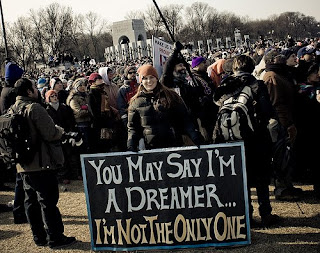 Overcome with Emotions...
Overcome with Emotions...
Irish Coverage
Edited by Sally A. Cruikshank
Author: Aerin Curtis
The articles written by foreign papers often discussed the effect that the change in leadership would have on their particular country, thus localizing the event, before examining the emotional depth of response in their own country and the U.S. However, they almost uniformly raised the issue of racism and the progress that Obama’s election marked.
In comparison, Hulse’s coverage was much more sober. It began with a comment and quotation on the economy before bringing in an emotional tone. Then it quickly returned to the somber themes of racism, President Lincoln, and America’s problems which are 'serious' and 'many.'
Hulse’s article also quoted mostly from Obama’s speech and political celebrities like Colin Powell. Conversely, though Sheridan’s article, and other foreign coverage, also quoted the speech, it gathered reactions from the crowd rather than other politicians.
Overall, I think the difference between the national and foreign coverage of Obama’s election comes down to perception. The media from other countries are hopeful about what this new president means since many of them did not like our last one. However, the domestic media have suddenly remembered their job is to criticize and critique the President and his policy - a job they did not always perform adequately under Bush. Now that Obama has taken office they are damping down their enthusiasm until he proves himself."
Analyzing History... Chinese Coverage
Author: Yilei Cheng
"By reading the U.S. media coverage on Obama's inauguration, I can feel the proud and enthusiasm of American through out the country. Leading media in each state and major city sent their reporters to Washington D.C. to cover the grand, historical event. Their reporters did a good job in finding interesting characters from hometown regions and telling their personal experiential stories of the excitement in the "once in a lifetime moment". Their reports appeal to their readers emotionally with personal stories. At the same time, the stories also reflect the local relevance that their readers concern, such as rights for black people, financial policy, oversea wars, etc...
Compared to the emotional appealing reports by the U.S. media, Chinese media coverage on Obama's inauguration are more rational and analytical. The correspondents appointed by Chinese media play not only the reporter's role, but also the expert of international business and politics. Their reports emphasized more on the facts of the event, and the economic and diplomatic parts of Obama's speech. A few individual experience stories took a supporting part of all the coverage on the Inauguration, definitely not the spotlight part.
Chinese readers care more about how this new U.S. president will influence their lives. Chinese media highlighted the relevant statements in Obama's speech and also provided critical analysis on the possible future situation. The mainstream ideas consider the new U.S. president Obama as "a pragmatist on economic policy" and "a center on diplomatic policy". They stated strong arguments to discuss if Obama can deliver his promises and fulfill the hope from American people.
For example, Yang Qingchuan, the D.C. correspondent of Reference News, a Chinese newspaper with the biggest daily circulation (3 millions) in China, published a feature-length article providing analysis on Obama's speech: Whether or not Obama's inauguration speech could become a classic one?"



No comments:
Post a Comment